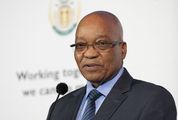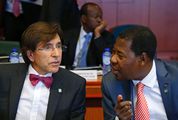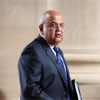IN A budget aimed at placing South Africa on a new economic trajectory, Finance Minister Pravin Gordhan on Wednesday announced that spending on education had not grown as fast as expected, but billions would go into education infrastructure.
Mr Gordhan has again made education the largest line item in the budget, with spending set to grow to R223.4bn in 2013-14 from R207bn in 2012-13. While higher, this is less than the R236bn suggested for the period by Mr Gordhan in his budget last year.
"Over the period ahead, the basic education sector will focus on improving numeracy and literacy, expanding enrolment in grade R, and reducing school infrastructure backlogs," he said.
Over the next three years R23.9bn will be available to the provinces to address education infrastructure backlogs, including R700m for technical schools and R820m for the construction of grade R classrooms and facilities for pupils with special needs.
But the slow pace of school construction will see the R1.65bn allocated for two new universities, in the Northern Cape and Mpumalanga, coming from R8bn allocated to the school infrastructure backlog grant.
A total of R7.2bn is to be removed from the school infrastructure grant, which has been rescheduled from three years to five to align spending with the provincial and national education departments’ capacity to implement building projects. A sum of R1.1bn will now go to community libraries and R4.47bn to the education infrastructure grant.
Provinces will be required to submit building plans two years ahead of implementation. Provinces with good records of implementation will be able to apply for extra funds, creating an incentive to plan well, the budget noted.
Transfers to higher education institutions will increase from R20.4bn in 2012-13 to R24.6bn in 2015-16. Student enrolment is expected to increase from 910,000 to 990,000 in 2015.
Mapungubwe Institute senior researcher Graeme Bloch said on Wednesday infrastructure spending on schools clearly needed to be addressed in a broader strategy to improve the system but, as always, more needed to be done in monitoring spending and holding people in the system to account.
The director of academic development at the University of Cape Town, Prof Ian Scott, said a great deal more needed to be done to improve the internal efficiency of spending within higher education. While more money was always useful, education already took up a "respectable percentage of gross domestic product", even as half of students failed to graduate and the academic-to-student ratio declined.

Picture: THINKSTOCK
IN A budget aimed at placing South Africa on a new economic trajectory, Finance Minister Pravin Gordhan on Wednesday announced that spending on education had not grown as fast as expected, but billions would go into education infrastructure.
Mr Gordhan has again made education the largest line item in the budget, with spending set to grow to R223.4bn in 2013-14 from R207bn in 2012-13. While higher, this is less than the R236bn suggested for the period by Mr Gordhan in his budget last year.
"Over the period ahead, the basic education sector will focus on improving numeracy and literacy, expanding enrolment in grade R, and reducing school infrastructure backlogs," he said.
Over the next three years R23.9bn will be available to the provinces to address education infrastructure backlogs, including R700m for technical schools and R820m for the construction of grade R classrooms and facilities for pupils with special needs.
But the slow pace of school construction will see the R1.65bn allocated for two new universities, in the Northern Cape and Mpumalanga, coming from R8bn allocated to the school infrastructure backlog grant.
A total of R7.2bn is to be removed from the school infrastructure grant, which has been rescheduled from three years to five to align spending with the provincial and national education departments’ capacity to implement building projects. A sum of R1.1bn will now go to community libraries and R4.47bn to the education infrastructure grant.
Provinces will be required to submit building plans two years ahead of implementation. Provinces with good records of implementation will be able to apply for extra funds, creating an incentive to plan well, the budget noted.
Transfers to higher education institutions will increase from R20.4bn in 2012-13 to R24.6bn in 2015-16. Student enrolment is expected to increase from 910,000 to 990,000 in 2015.
Mapungubwe Institute senior researcher Graeme Bloch said on Wednesday infrastructure spending on schools clearly needed to be addressed in a broader strategy to improve the system but, as always, more needed to be done in monitoring spending and holding people in the system to account.
The director of academic development at the University of Cape Town, Prof Ian Scott, said a great deal more needed to be done to improve the internal efficiency of spending within higher education. While more money was always useful, education already took up a "respectable percentage of gross domestic product", even as half of students failed to graduate and the academic-to-student ratio declined.















 News, views and analysis of Finance Minister Pravin Gordhan's 2013 budget
News, views and analysis of Finance Minister Pravin Gordhan's 2013 budget










Post a comment